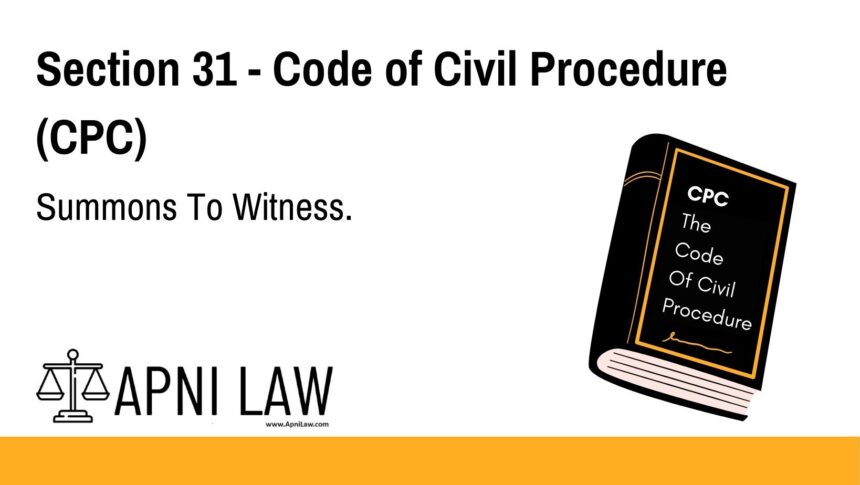Code
CPC The provisions in sections 27, 28 and 29 shall apply to summonses to give
evidence or to produce documents or other material objects.
Perfect 👍 Let’s draft the SEO-optimized structured article for this provision of the CPC (Summons to Witnesses & Documents) with the same format you’re using for ApniLaw. I’ll also make internal links to Sections 27, 28, and 29 CPC for SEO interlinking.
Section 30 CPC: Application of Sections 27, 28, and 29 to Summons for Witnesses and Documents
Code
Section 30 – Code of Civil Procedure
The provisions in sections 27, 28 and 29 shall apply to summonses to give evidence or to produce documents or other material objects.
📖 Source: Section 30 CPC – Application of Sections 27, 28, and 29 to Summons (ApniLaw)
Explanation
Section 30 CPC extends the procedure of issuing summons in civil cases (covered under Section 27 CPC, Section 28 CPC, and Section 29 CPC) to witnesses and documents.
Key Points:
- Summons are not limited to defendants but may also be issued to witnesses.
- Witnesses can be summoned either to:
- Give oral evidence before the Court, or
- Produce documents or material objects required for adjudication.
- The procedure of service, timeframes, and manner laid down in Sections 27–29 apply here as well.
This provision ensures that witnesses and evidence can be effectively brought before the court, making the trial process fair and complete.
Illustrations
- Example 1: Summoning a Witness
In a property dispute, the Court summons a neighbour to give evidence about boundary demarcations. The summons follows the same rules as service to a defendant. - Example 2: Producing a Document
In a contract dispute, the Court issues a summons to a bank manager to produce account statements. The procedure under Sections 27–29 CPC applies. - Example 3: Summons Beyond Jurisdiction
A witness residing in another State is summoned to produce documents. The service of summons is governed by Section 28 CPC.
Common Questions and Answers
1. What is the scope of Section 30 CPC?
It applies the provisions of Sections 27–29 CPC to summons issued for witnesses and for production of documents or material objects.
2. Can a witness be compelled to attend?
Yes. A witness duly summoned must appear and comply; failure may result in penalties under CPC and Indian Penal Code (IPC).
3. Does this section apply to electronic records?
Yes. Modern interpretation includes electronic records, emails, and digital documents as “documents” that can be summoned.
4. Can a summons under Section 30 CPC be served outside India?
Yes. If applicable, service abroad can be covered through Section 29 CPC (foreign summons).
5. Why was Section 30 necessary?
Without it, there would be ambiguity on whether procedural rules of summons apply equally to witnesses and documents. This section clarifies and extends the same.
Conclusion
Section 30 CPC ensures that summons rules applicable to defendants are equally applicable to witnesses and documents, thereby strengthening the evidentiary process in civil litigation. It provides courts with authority to compel presence of witnesses and production of necessary evidence, ensuring a just adjudication.
👉 For more details, visit: Section 30 CPC – Application of Sections 27–29 to Summons (ApniLaw)








